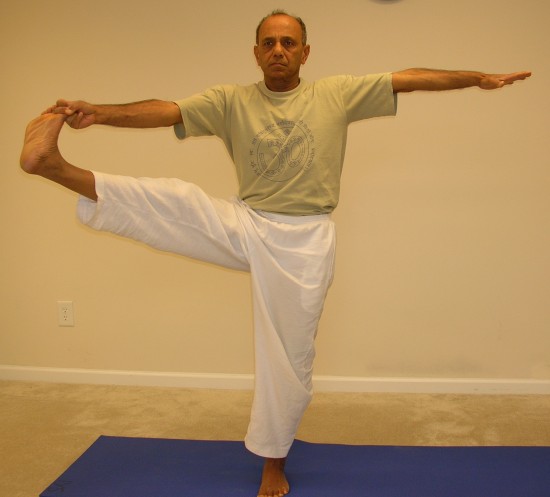Yoga Immersion - level 2
Program information
- What: Yoga immersion, Level 2
- Time: 6:00 AM – 7:45 AM
- Location: Online via Zoom or in-person at the home studio
- Commitment:
- A firm commitment to complete the program without missing a day
- At the end of the program, continue yoga practice at home in an effort to make it a life-long habit
- To register: Fill out the registration form, providing information in all the fields, and submit it online
Strongly recommended
In addition to committing to the yoga practice as outlined above, I would strongly urge you to commit to the following for the duration of the program:
- ‘sattvic’, light, nutritious, VEGETARIAN food (no meat, poultry, fish or eggs)
- No alcohol, drugs, tobacco or any other item of similar nature
- A personal meditation practice of at least 15 minutes on a daily basis
Daily Practice will include:
- Asana: We will practice a variety of asanas (physical postures) during these 21 days. Even though we will maintain the same overall routine, each day we will either introduce a new pose or practice variations of different poses. The asana practice will improve strength, flexibility, endurance and balance in different parts of the body.
In this Level 2 program, we will be practicing some of the intermediate level asanas (physical postures) and pranayama practices that are not covered in the regular yoga programs. These will include:
- Shirshasana (head stand)
- Mayurasana (peacocl pose)
- Bakasana (crane pose)
- Ardha-chandrasana (half moon pose)
- Hand stand
- Vrishchikasana (scorpion pose)
- Sarvangasana (shoulder stand – some level 2 variations)
- Pranayama – kumbhaka (breath retention) and bandhas (locks)
- and more ….
- Pranayama: Various pranayama (breathing techniques) practices will include – kapalabhati (breath of fire), bhastrika (bellows breath), a number of deep breathing practices, sectional breathing, cooling breaths, breath retention (kumbhaka), bandhas (energy locks) and more.
- Meditation: We will try to understand what meditation is all about and practice a few simple meditation techniques
- Deep relaxation: Yoga Nidra (deep relaxation) helps not only relax the body but also helps calm the nerves, calm the mind and activate the parasympathetic nervous system
- Yoga philosophy: Concepts from yoga philosophy will be sprinkled through the practice of asana, pranayama and meditation so we can develop a deeper understanding of the yoga practice as well as learn more about what our true identity is.
Benefits of the program
Besides the obvious benefits of a regular, daily yoga practice at the physical level (weight loss, flexibility, strength, endurance, balance etc.), I would like to emphasize benefits more at the mental, intellectual and even deeper levels. Patanjali, in chapter 2 defines ‘kriya yoga’ as a combination of ‘tapas’ (austerities), ‘svadhayaya’ (study of self and of scriptures), and ‘Ishvara Pranidhana’ (surrender to a higher principle). He further sates that by practicing ‘kriya yoga’, one can overcome all the ‘kleshas’ or afflictions (pain and suffering) of life. In the modern context the word ‘klesha’ can be equated with mental stress that we all face on a daily basis. Now, this is a pretty strong statement as all of us want to learn how to cope with stress in our lives. I plan to incorporate all these three components of ‘kriya yoga’ into our practice during the yoga immersion program.
Here are some of the benefits of attending this yoga program:
- At the completion of the program, develop an on-going daily practice of your own
- Natural weight management
- Develop a body that is more flexible, stronger and healthier
- Learn how to manage stress effectively
- Reduce chronic pain
- Develop the habit of waking up early, thus leaving much more of the day for yourself
- Morning yoga gives you abundant energy and vitality for the rest of the day
- Develop a strong will-power, self-discipline, self-control and high self-esteem
- Improved productivity, time management
- Detoxify and cleanse your body at all levels – physical, mental and emotional
- Self-analysis giving a better understanding of the intricacies of the mind
- Develop healthier eating habits
- As you go through the program, you may realize some other benefits that are not listed here
- and more …….
Background
Why yoga immersion?
Patanjali, in his Yoga Sutras defines yoga as “the ability to control the fluctuations of the mind” (sutra 1.2). In order to achieve that goal, Patanjali recommends ‘abhyasa’ (practice – �sutras 1.12 – 1.14) and ‘vairagya’ (detachment – sutras 1.15 – 1.16) as the two key ingredients of a personal endeavor. In order to establish a regular practice for any endeavor as defined by Patanjali, one needs to have a commitment and a strong will-power. To develop such a will-power Patanjali offers the five yamas (sutra 2.30) and five niyamas (sutra 2.32). However, I believe that one of the values that truly helps develop that self control and commitment is the niyama of ‘tapas’ (austerity – sutra 2.43). The word ‘tapas’ in Sanskrit means ‘heat’. An example usually given is the use of intense heat to purify gold. In yoga ‘tapas’ usually refers to practices that make one strong physically and mentally. One who practices ‘tapas’ is known as a ‘tapasvin’. A tapasvin can easily withstand the dualities of life like heat and cold, honor and dishonor etc.
The yoga immersion provides us an opportunity to practice ‘tapas’ as we are making a commitment to a regular practice.



